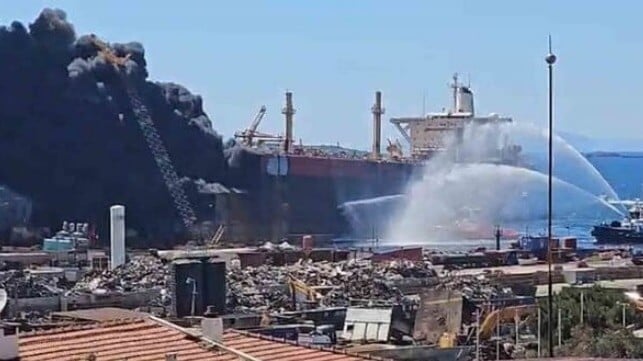Video: Fire Breaks Out on Controversial Tanker at Turkish Scrapyard

A supertanker, which for many years had been used as a storage platform off Libya, is once again causing controversy after a fire broke out aboard the vessel. The tanker known as Sloug (251,500 dwt) is at a Turkish yard being dismantled.
A fire call was issued around 1100 on July 3 at the Simsekler yard in the Aliaga region of Izmir, Turkey. Reports indicate the partially dismantled tanker was evacuated without injury, but due to concerns, other parts of the yard were also evacuated as the black smoke billowed from the hulk.
The local fire department responded with units from land and six fireboats were also brought in for an effort to contain the fire and cool the hull. Reports indicate aerial firefighting was not being permitted for fear of explosions from the tanker. The fire continued to burn through the night with reports suggesting it could take days to fully control the inferno.
It is the latest in a series of controversies around the tanker, which was built in Italy in 1973. It was in commercial service for 16 years, but in 1989 converted for floating storage off Libya. It continued as the FSO Sloug before finally being decommissioned in 2017. It was said that the vessel, which is 349 meters (1,145 feet) in length, had become unusable, with some reports suggesting it was structurally compromised.
AL?A?A'DA TANKER GEM?S?NDE YANGIN DEVAM ED?YOR
— Radyo Trafik ?zmir 102.5 (@radyotrafik35) July 3, 2025
?zmir'in Alia?a ilçesinde hurda gemilerinin geri dönü?türüldü?ü gemi söküm bölgesinde, Libya'dan gelen Sloug adl? gemide söküm çal??malar? s?ras?nda ba?layan yang?n devam ediyor.
Alia?a Gemi Söküm Sahas?'nda bulunan Sloug adl?… pic.twitter.com/Aa1SNhDC48
Alia?a'daki gemi yang?n? gökyüzünü karartt?: Sloug kontrol alt?nda https://t.co/SufkOvSEuL
— Yeni ?zmir (@yeniizmir_haber) July 4, 2025
Turkish interests reportedly acquired the vessel for dismantling, but before they could retrieve it, it arrived in Egypt. There, it was met with environmental protests and forced to leave the country. It finally arrived in Turkey in February 2023, but additional protests followed.
Environmentalists claimed the ship had been used to store waste, and they said there was as much as 6,000 tons of chemical waste still aboard. The recyclers responded by saying that it was not correct that it was an oil storage unit. Papers were released purporting to come from the former owner, who claimed the tanks had not been vented, and there could be a buildup of dangerous vapors. They estimated there were 50 tons of residual oil still on the vessel.
Turkey’s Ministry of Environment responded to parliamentary questions saying it had inspected the vessel. It contended that there was no large quantity of hazardous material aboard other than the essential parts.
Gemi Söküm’de Sloug gemisi yan?yor!
— EGE ??Ç? B?RL??? (@Egeiscibirligi) July 3, 2025
Alia?a Gemi Söküm sahas?nda ?im?ekler ?antiyesinde bulunan Sloug gemisi saat 11 civar?nda yanmaya ba?lad? ve halen yang?n sürüyor, bir kaç ?antiyede çal??ma durduruldu. Ölü ya da yaral? olmad??? bilgisi geçildi.
O pic.twitter.com/KhkVdy4FHo

that matters most
Get the latest maritime news delivered to your inbox daily.
Pictures show that the forward section of the vessel has already been removed, and large portions appear opened. The stern section is still largely intact. However, the concerns over possible residuals aboard and dangerous vapors were limiting the firefighting efforts to ensure the crews remained safe and away from any possible explosions.
A union group issued a statement demanding an investigation. It said dismantling had been permitted to start earlier this year after it was “supposedly cleaned out.” They are demanding that all work remain stopped at the yard until the environment is safe.
